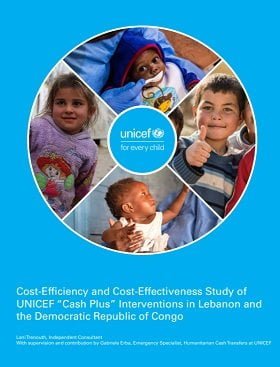Cost-Efficiency and Cost-Effectiveness Study of UNICEF “Cash Plus” Interventions in Lebanon and the Democratic Republic of Congo.
The combination of basic services delivery and cash transfers is known among humanitarian practitioner as “cash plus”. This approach represents a solid comparative advantage for UNICEF considering its footprint in basic services delivery as well as its commitment to scale up humanitarian cash transfers. Following UNICEF’s efforts to achieving better results for children in a more efficient and effective way, this study presents the results of two analysis as part of the organization’s steps towards expanding the evidence base on humanitarian cash transfer.
The paper builds on existing impact evaluations performed on UNICEF programmes in DRC, where cash was used as a complement to the treatment of severe acute malnutrition (SAM), and Lebanon where cash was used to ensure that demand driven barriers to access education could be overcome. By leveraging historic costing data at country level and triangulating it with the impact observed the paper reveals the relative cost of achieving the desired outcome between beneficiaries who received the basic service alone and those who received cash on top of the service.



